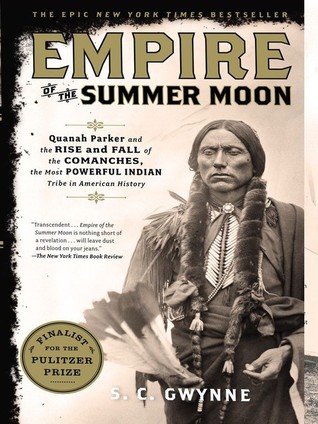More on this book
Community
Kindle Notes & Highlights
by
S.C. Gwynne
Read between
February 17 - February 17, 2023
It is one of history’s great ironies that one of the main reasons Mexico had encouraged Americans to settle in Texas in the 1820s and 1830s was because they wanted a buffer against Comanches, a sort of insurance policy on their borderlands. In that sense, the Alamo, Goliad, San Jacinto, and the birth of the Texas republic were the product of a misguided scheme to stop the Comanches.
There were no horses at all on the continent until the Spanish introduced them in the sixteenth century.
The agent of this astonishing change was the horse. Or, more precisely, what this backward tribe of Stone Age hunters did with the horse, an astonishing piece of transformative technology that had as much of an effect on the Great Plains as steam and electricity had on the rest of civilization.18
Abandoned by the Spanish, thousands of mustangs ran wild into the open plains that resembled so closely their ancestral Iberian lands. Because they were so perfectly adapted to the new land, they thrived and multiplied. They became the foundation stock for the great wild mustang herds of the Southwest. This event has become known as the Great Horse Dispersal.
(So many raids were made by moonlight that in Texas a full, bright spring or summer moon is still known as a Comanche Moon.)
What Chivington had done was what many people in the west, including the regular army, believed had to be done. The army’s distaste for Chivington had more to do with style and with the savagery of his raw recruits. He had, after all, attacked a village under truce. Otherwise, it was clear from the reaction on the raw frontier that it was long past the time when it had become morally justifiable to kill Indian women and children.
He dined often with a family named Miller, and at one meal he stated that the white man had pushed the Indian off the land. When Mr. Miller asked how the whites had done this, Quanah told him to sit down on a cottonwood log in the yard. Quanah sat down close to him and said “Move over.“ Miller moved. Parker moved with him, and again sat down close to him. “Move over,” he repeated. This continued until Miller had fallen off the log. “Like that,” said Quanah.
on his gravestone, which reads: Resting here until day breaks And shadows fall And darkness disappears Is Quanah Parker, the last chief of the Comanches.


